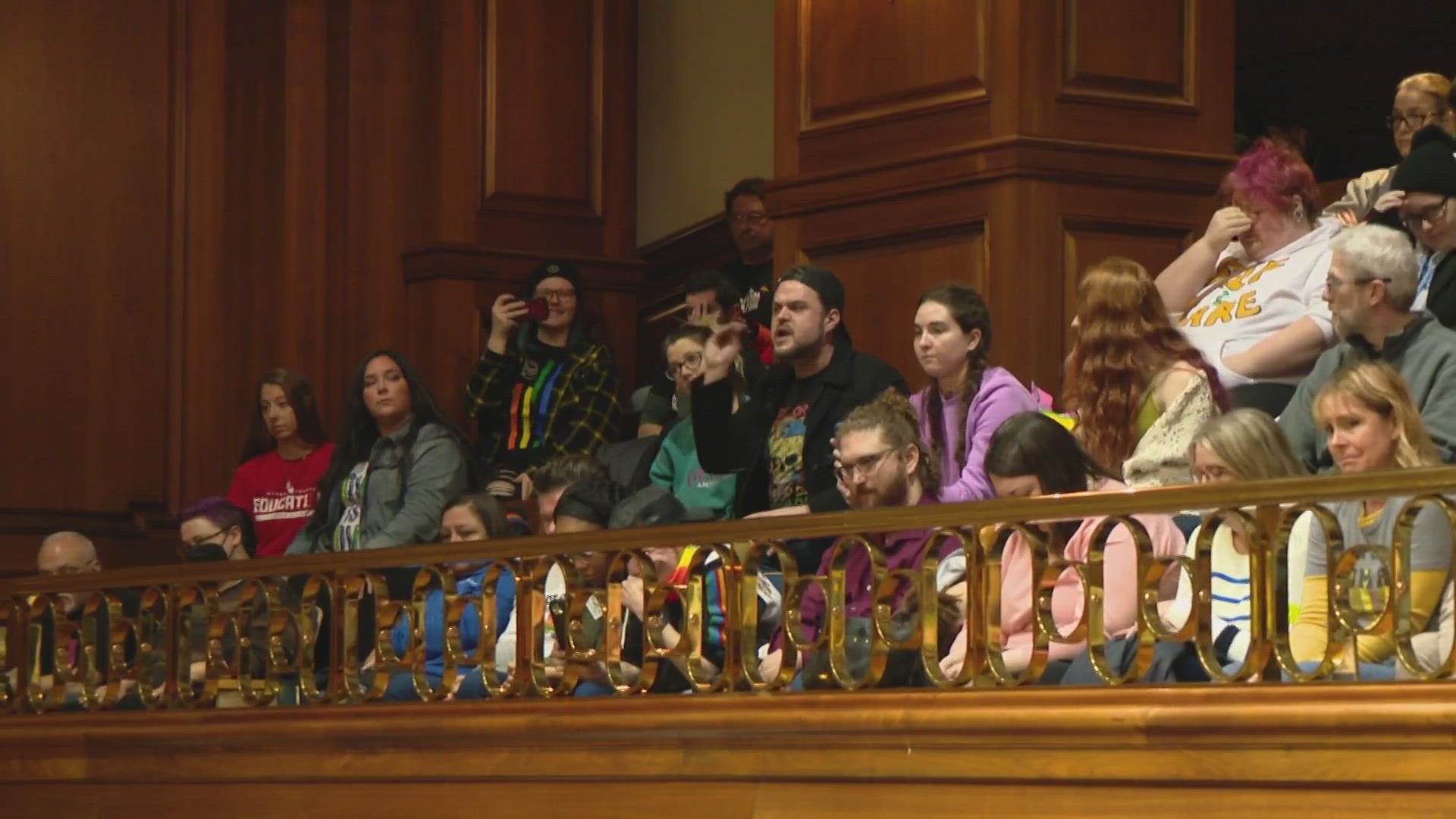INDIANAPOLIS — Teachers in Indiana public schools could be required to tell parents if a student changes their gender identity or preferred name under a bill House committee members approved Monday.
A vociferous crowd lingered outside the House chamber through hours of testimony, cheering opponents of the measure and booing Republican lawmakers who back it.
“It’s a name. It’s just a name. It’s a name. You guys are fighting over kids’ names. Children's names. You should be ashamed,” shouted one man during the discussion — before Indiana State Police escorted him out of the House Chamber.
Opponents of the bill — which lawmakers voted 9-4 to send to the full House for consideration — said it would alienate LGBTQ students, particularly transgender youth, and possibly force kids to come out to their parents.
“The goal of House Bill 1608 is to empower Hoosier parents by reinforcing that they’re in the driver’s seat when it comes to introducing sensitive topics to their children,” said the bill’s author, Republican Rep. Michelle Davis.
Other supporters agreed with Davis' notion.
"If a student questions their gender identity to a teacher, “the best answer is, you can talk to your parents,” said Micah Clark, executive director of the Indiana Family Association.
“A teacher should never be forced to abandon their beliefs about the meaning of male or female just to keep their jobs,” said Matt Sharp with the Alliance Defending Freedom.
The parental notification proposal was among several amendments to a bill that started out more closely resembling Florida legislation enacted in March 2022. The so-called “Don't Say Gay” bill drew intense national scrutiny from those who argue it marginalizes LGBTQ people. Proponents say the measure is reasonable because parents, not teachers, should handle such subjects with their children.
The original Indiana bill would have prohibited teachers from teaching kindergarteners to third graders about topics related to gender identity and sexuality. It was amended to limit the banned topics solely to sexual education — something already uncommon in early grades.
“If a child in first grade asks their teacher, ‘Why does Joey have two mommies and I have one mommy?’ Is the teacher allowed to respond," asked Democratic Rep. Ed Delaney.
“You can have two moms, you can have two dads, or you can have a mom and a dad. The rest of the discussion should be with the parents I believe,” responded Davis.
Missouri lawmakers also rejected a more restrictive version of the “Don’t Say Gay” law. A Senate committee in that state voted to advance a measure that would require public school teachers to tell parents if a child “express discomfort or confusion” about their gender identity or if they request to use different pronouns.
Haras Shirley, a transgender man who testified Monday, said the House legislation is “a direct conflict of interest to what I’m sworn to do” for students as a school resource officer at an Indianapolis high school.
“I will continue to be a beacon for my students, no matter the cost,” Shirley said.
Indiana's House bill, authored by Republican Rep. Michelle Davis, would only apply to public schools and would prohibit them from disciplining teachers or staff who use “a name, pronoun, title, or other word to identify a student that is consistent with the student’s legal name."
“This is some common sense legislation to support transparency and parents' fundamental rights, which shouldn’t get dropped at the classroom door,” Davis said Monday.
But Chris McGrath, a teacher from Lafayette, Indiana, disagreed.
“How do I not have the right to compel (a school) to call my child a name that I told them that I want my child to be called?” McGrath asked. “I could be insisting that they use the name that she’s got right now, and that they use she/her pronouns. How can I not compel the institution to do that?”

